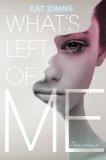Summary | Excerpt | Reviews | Beyond the Book | Read-Alikes | Genres & Themes | Author Bio

The Hybrid Chronicles, Book One
by Kat ZhangThis article relates to What's Left of Me
 Dystopian themes have appeared in literature throughout history, but the first use of the word is credited to John Stuart Mill. In 1868, during a speech to the British House of Commons, he played upon the well-known word, "utopia" (adding "dys," which is derived from a Greek word meaning "bad") and used it to criticize legislators who supported a policy with which he disagreed. He said that they were "dys-topians" because they were supporting a policy that was "too bad to be practical."
Dystopian themes have appeared in literature throughout history, but the first use of the word is credited to John Stuart Mill. In 1868, during a speech to the British House of Commons, he played upon the well-known word, "utopia" (adding "dys," which is derived from a Greek word meaning "bad") and used it to criticize legislators who supported a policy with which he disagreed. He said that they were "dys-topians" because they were supporting a policy that was "too bad to be practical."
As to the word "utopia," it would have been familiar to Mill's audience because it had been around for over 350 years, having been coined by Thomas More (the Renaissance humanist and writer) who combined the Greek words for "good place" (eutopia) and "no place," (outopia) for the title of his 1516 book about an idyllic island society. His Utopia was not the first of its kind, however. Just as dystopian works existed before the word began to be used retroactively to describe them, there were many earlier works in the utopian vein - Plato's Republic (ca. 380 BC) is considered to be the first of these - but what is most striking is not just that both More's and Mill's terms stuck and survived, but that the word "dystopia," in particular, has made its way out of literary circles and into the common vernacular of young readers.
At its most basic, a dystopia is "anti-utopia." In other words - as A.H. Abrams succinctly puts it in A Glossary of Literary Terms - if a utopia is a "good place," then a dystopia is a "bad place." Utopian works typically grow out of the writer's criticism of modern life - its politics, economics, or the state of society as a whole. Utopian novels depict ideal nations where certain modern day problems have been solved, or don't exist, and life runs according to a new, superior plan. Dystopian novels on the other hand, tend to present an oppressive future where certain events - such as war or a population problem - have played out to the extreme and resulted in the development of a controlling government, or other authority, that restricts both personal freedom and individuality, and/or enforces unpleasant and confining regulations.
There are other interesting features that define modern dystopian novels. The setting is typically a future time or alternate reality, which allows the writer to create a society that is similar to our own, but with a major difference, such as an authoritative body that has gotten out of control, or a disease that is ravaging society. The dystopian society largely supports the rules and restrictions that have been set upon them, and sees them as necessary. This insures that like Addie/Eva in What's Left of Me, the protagonist cannot turn to family and friends for help, and feels that he or she is alone. Classic examples of 20th century dystopian novels following this form include Aldous Huxley's Brave New World (1932), George Orwell's Nineteen Eighty-Four (1949), and Ray Bradbury's Fahrenheit 451 (1953).
The catalyst for the controlling conditions in a dystopian society may be an apocalyptic event; however, the terms "dystopian" and "post-apocalyptic" are not synonymous. Erin Bowman, an author of young adult books, has set up a lighthearted flowchart for determining whether a fictional world is a dystopia, an "isolated dystopia" (her term) or post-apocalyptic. She doesn't consider crossovers; so for example, she puts The Hunger Games only in the post-apocalyptic category. Click on the tiny picture of the chart to see the larger version.
Picture of John Stuart Mill, who is credited with coining the word, "dystopia," from Popular Science Monthly
Filed under Books and Authors
![]() This "beyond the book article" relates to What's Left of Me. It originally ran in October 2012 and has been updated for the
August 2013 paperback edition.
Go to magazine.
This "beyond the book article" relates to What's Left of Me. It originally ran in October 2012 and has been updated for the
August 2013 paperback edition.
Go to magazine.
Your guide toexceptional books
BookBrowse seeks out and recommends the best in contemporary fiction and nonfiction—books that not only engage and entertain but also deepen our understanding of ourselves and the world around us.